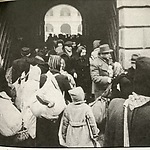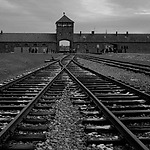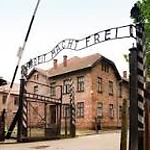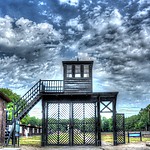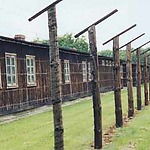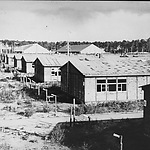Westerbork was established in October 1939 by the Dutch government to house Jewish refugees who had entered the country illegally. When the German invaded the Netherlands on May 10, 1940, there were 750 refuges in the Camp. The Germans in 194o decided to move all refugees from other camps to Westerbork, after the fall of the Netherlands. Camp Westerbork led a “double life”. While most inmates stayed at the camp for a short periods of time there was also a permanent camp population, mostly German Jews, members of the Jewish Council, camp employees and certain other categories of persons exempt from deportation. The arrest of several hundreds of young Jews let to the strike of the Dutch workers. After the General strike by Dutch workers in 1941, the Nazi’s tighten the rules and regulations. At that time they started to separate the Jewish residents form the Dutch citizen. in July 1942 the Nazi’s took over the control of Camp Westerbork form the Dutch authorities. They established a Jewish Administrative Council.
On September 5, 1942, the family decided to voluntarily go to Camp Westerbork to be with there father Jacob Scheuer, they wanted to be together as a family in a time when that became more and more difficult for Jewish people. ( Jacob Scheuer worked in refugee Camp Westerbork before the Germans took over the control of the camp). The head of the Camp administration Kurt Schlesinger had become a good friend and was an old colleague of Jacob Scheuer. There reasoning was that they would be safer as a family in Camp Westerbork than in Bilthoven were they lived with there grandmother and other family members. The rest of the family however arrived shortly there after at Camp Westerbork ( grandmother, uncles, aunts, nieces and nephews). Shortly after they arrived at Westerbork they were deported to Germany and perished in various concentration camps.
Ernst (Jacob’s son) was arrested in January of 1944, because he had forgotten to take of his cap of for a German guard at Camp Westerbork. As a result of this small incident Ernst was put on the list for deportation on the next train that left the camp for Germany. The family and other people at the camp had no idea what the end destination was of these transports. Jacob Scheuer as head of the family decided that when Ernst had to go on the next transport, there family would go with him. The family departed with the deportation transport of January 18, 1944. Those weekly transportation carried 1000 people.
Because Jacob Scheuer had been a soldier in World War I, for which he had been awarded the Iron Cross. Because of this, the Camp Commander had decided to put the family on the train transport for Theresienstadt which was a so called “model ghetto/camp”. The family stayed there from January 18 till May 16, 1944. During that time the Nazi’s had given permission for a delegation of the Danish Red Cross to vist Theresienstadt. In preparation for this visit, the camp was spruced up and the population was diminished via deportation. In September 1943, December 1943 and May 1944, just before the scheduled visits, there were a total of seven transports on which 17,517 Jews were sent to the dead camp at Auschwitz. Ilse remembers being told to clean things up in anticipation of the Red Cross visit. In mid May, our family was told by the Group Leader to register at a cenrain place in front of the SS Office. We were informed to get our belongings together and come to the train station the next day. Unaware of our destination or what the future held in store for us, my parents, brother and sister and I were deported in a catle train and left Theresienstadt on May 16, 1944.
We did not realized that our family of Jacob and Helene Scheuer arrived in on My 18, 1944 in Auschwitz II [Birkenau), Polen and we would be there till July of 1944. After the selection process and the separations of man, women and children, Helene, Ilse and Ruth would stay in Auschwitz for the time being. Ernst had been selected to work in a forced hard labor camp and he was deported on July 3 to Schwartzheide (Senftenberg) a sub camp of Sachsenhausen. He had a to work in a military factory. The living conditions in the camp and factory were terrible.The sadistic guards let the forced laborers work till they fell death to the ground. Ernst died on April 16, 1944, six days before the camp was liberated on April 22, 1944..
During one afternoon, when they were already some weeks in Birkenau, ilse and Ruth recognized there father. Jakob Scheuer was able to give his daughters information written on a small piece of paper. This was the contact In formation of family members and friends who had been able to emigrate to the USA just before the outbreak of World War II. He told his daughters that he had transferred money to the USA and told them that they were young and would survive the war. Jakob then gave his daughters the traditional Hebrew blessing that was prayed at each Sabbath at the Synagogue. “May the G-d make you like Sarah, Rebecca, Rachel and Lea. May G-d bless you and watch over you. May G-d shine his face toward you and show you favor. May G-d be favorably disposed toward you and grant you peace.” We quickly said our goodbyes and went back to our barracks. It was the last time we ever saw our father.
Not knowing what would be happening to them, Helen and her daughters and the others were marched to a large building. Upon entering the building they we were given a moist towel and were directed to the showers. Once everyone was inside the shower room was closed off with a metal door. In the ceiling where round opening resembling a shower head, but no water came out of it. We waited for a long time before on the other end of the room the door finally opened. We realized later that were to be gassed but the Germans had run out of gas canisters. Helene, her daughters and other family members who were still alive stayed in Auschwitz II (Birkenau) for a relative short period of time. Long enough for this short period of time to have all of there family members being condemmed to die for no reason other than that they were Jews. Ilse and Ruth survived, but they carry with them the meomories of that horrific place, which even today is a grotesque testament to the very depths of human cruelty.
In July of 1944 Ilse and Ruth were deported to Stutthof, Polen. This was a forced labor camp for the Focke-Wulf airplane factory. They only stayed her for a short period of time.
In the middle of the summer of 1944 ilse and Ruth were deported to PRaust, Polen I in open train carriages. This was a women’s sub camp of Stutthof. The physical circumstances of the camp were equal to Auschwitz. But the every day life was not as terrible as Auschwitz.
The dead march of February, 1945 started without any notice or explanation. We later leaned that the Russian Army was advancing. All prisoners were put in rows and order to march out of the Concentration Camp. The dead march had begun, many where sick and hungry, anyone who could not keep up in the icy cold winter weather was shot at the spot. When we had been on this march for about a week, we stopped at an empty farm building to rest. We now had learned that the Russian Army was closing in and Ilse and Ruth decided that when there was an opportunity to escape, they would try it. There first attempt failed. By the end of the March of 800 hundred women there were only 50 survivors left. From the documents the Nazi’s kept we learned that they would march the group of 800 women to the Baltic Coast and than would drive the survivors in to the Sea to drown. The SS officers that were in charge of the 50 women did not wanted to be taken prisoner by the Russian’s and told the group of women that they were free and could do what they wanted. Ilse and Ruth walked over frozen farmers fields and found a abounded farm house were the rested. They were now in a village called Putzig that had just been liberated from the Nazi’s. The authorities and the doctors were very helpful In caring for the survivors. They departed for Krakow and from there they went to Praag were they arrived in June off 1945. Here they leaned that there were Dutch soldiers stationed in Pilsen and the decided was made that they wanted to go there, because they did not wanted to end up in Russian hands. From there they traveled to Bamberg were they were medical examined and received the correct travel papers and traveled on to liberated Holland. Via Maastricht they traveled to Utrecht were they had family. Here they were united with there uncle Robert Daniel and aunt Martha Daniel Stein and there spouses, who had survived the war by going into hiding.

